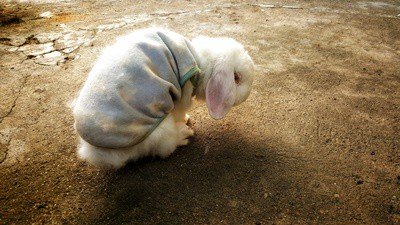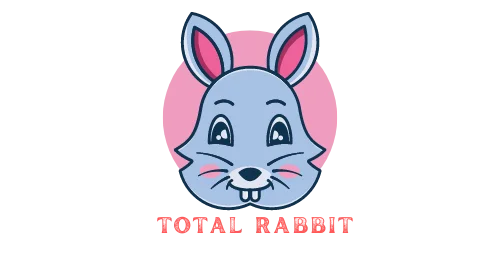How To Care for An Older Rabbit

As our rabbits age, their needs change and we must adjust how we care for them. Here are some tips on how to care for an older rabbit.
First, it is important to have your rabbit checked by a veterinarian at least once a year.
This will help catch any problems early and keep your rabbit healthy. Older rabbits are more prone to health problems so regular vet check-ups are crucial.
Second, make sure your rabbit has a good diet.
A diet rich in fiber is important for keeping your rabbit’s digestive system working properly. Older rabbits may also need more calcium in their diet to prevent osteoporosis. You can talk to your vet about what type of food is best for your older rabbit.
Third, provide your older rabbit with plenty of exercise and stimulation. Exercise is important for all rabbits, but it’s especially important for older rabbits to stay active and maintain their muscle mass. Provide them with plenty of toys and space to play and explore.
Fourth, create a comfortable environment for your older rabbit. Make sure they have a quiet place to rest away from loud noises and activity levels that might be too much for them. Older rabbits also tend to get colder easily so consider providing them with a blanket or heated bed in winter months.
Caring for an older rabbit can be rewarding and give you extra time to bond with your furry friend as they enter their golden years!
- -Rabbits over the age of five are considered senior citizens in the rabbit world
- -As your pet ages, he will become less active and his fur may become grayer
- -To keep your older bunny healthy and comfortable, you will need to make a few changes in his care
- -Give your bunny plenty of hay to eat
- Hay is essential for a rabbit’s digestive system and helps wear down their teeth
- -Offer fresh vegetables daily
- Older rabbits may not have as much of an appetite as they did when they were younger, so offer smaller portions more often throughout the day
- -Provide fresh water at all times
- Change the water daily and clean the bowl with soap and water weekly
- -Make sure your rabbit has a comfortable place to sleep
- A soft blanket or pillow in his hutch or cage will do nicely
- -Take your rabbit to see the veterinarian at least once a year for a checkup and teeth cleaning
10 Tips to Care for Your Elderly Rabbit
Signs of Old Age in Rabbits
As rabbits age, they may show some external as well as internal signs of old age. These can include:
External Signs:
-Graying or whitening of the fur, especially around the face and muzzle
-Thinning of the fur
-Loss of muscle mass and tone, resulting in a “sagging” appearance
-Decreased activity level and motivation to move around or play
Internal Signs:
-Arthritis or stiffness in the joints -Kidney disease -Cancer -Heart disease -Liver disease -Digestive problems All of these conditions are more common in older rabbits and can lead to a decline in health.
If you notice any of these signs in your rabbit, it’s important to take them to a veterinarian for an evaluation. Early diagnosis and treatment can often improve the rabbit’s quality of life and extend their lifespan.
Elderly Rabbit Incontinence
Rabbits are wonderful pets, but as they age they can develop health problems. One common issue in elderly rabbits is incontinence.
There are a number of possible causes of incontinence in rabbits, including kidney disease, bladder stones or tumors, and neurological conditions.
If your rabbit is leaking urine, it’s important to take them to the vet for an examination.
Incontinence can be frustrating for both you and your rabbit, but there are treatments available that can help improve the situation. Medications can be prescribed to help control urinary leakage, and changes to diet and litter box management may also be recommended.
If your elderly rabbit is dealing with incontinence, know that you’re not alone and help is available. With proper treatment, many rabbits are able to continue enjoying a good quality of life despite this condition.
Elderly Rabbit Keeps Falling Over
If your elderly rabbit is falling over, it’s likely due to a condition called vestibular disease. This is a problem with the inner ear that can cause dizziness and imbalance. It’s most common in older rabbits, and can be caused by a number of things, including infection, trauma, or even just old age.
Vestibular disease can be very serious, so if your rabbit is falling over, it’s important to take them to the vet right away. There are some treatments that can help improve the condition, but it’s important to catch it early.
14 Year Old Rabbit
Assuming you would like a blog post discussing why a 14 year old rabbit is a great pet:
Rabbits make great pets for people of all ages, but they can have a particularly long lifespan when properly cared for. A 14 year old rabbit is a great pet because they are still relatively spry and active, but have the benefit of years of experience.
This means that they are less likely to startle easily or be as high-maintenance as a younger rabbit. They also tend to bond well with their owners and can be trained to do simple tricks or behaviors. If you are considering adding a furry friend to your family, an older rabbit like a 14 year old could be the perfect fit!

Credit: rabbit.org
How Do I Know If My Rabbit is Getting Old
As your rabbit ages, you’ll notice changes in their energy levels, behavior, and appearance. Here are some common signs that your rabbit is getting old:
1. They become less active and playful.
2. They start to sleep more during the day and night.
3. Their fur becomes thinner and grayer.
4. Their appetite decreases and they lose weight.
5. They drink less water than usual.
6. They have difficulty moving around and may even stop using their litter box properly.
What are Some Common Health Problems That Older Rabbits Experience
As rabbits age, they are more susceptible to a number of health problems. Some common health problems that older rabbits may experience include:
1. Arthritis – This is a common condition that can cause pain and stiffness in the joints.
Older rabbits may have difficulty moving around and may even start to lose their balance.
2. Kidney disease – This is a serious condition that can lead to kidney failure. Symptoms of kidney disease include weight loss, decreased appetite, and increased thirst.
3. Cancer – Unfortunately, cancer is also relatively common in older rabbits. The most common type of cancer in rabbits is lymphoma, which starts in the lymph nodes and spreads throughout the body. Other types of cancer that commonly affect older rabbits include skin cancer and gastrointestinal tumors.
4. Heart disease – Heart disease is another serious health problem that can affect older rabbits.
How Can I Make My Older Rabbit More Comfortable
As your rabbit ages, you may notice changes in his energy level, activity, and eating habits. He may become less active and playful, and sleep more. His fur may thin out, and he may lose muscle mass.
These changes are natural as your rabbit enters his senior years. You can help your aging rabbit stay comfortable by making a few adjustments to his diet and environment.
Aging rabbits tend to have a decreased appetite, so it’s important to offer him foods that are high in nutrients and easy to digest.
Senior-specific rabbit food pellets are available at most pet stores, or you can ask your veterinarian for a recommendation. Include plenty of hay in your rabbit’s diet, as it’s an essential source of fiber for keeping his digestive system healthy. Older rabbits also benefit from extra vitamin C, which you can provide in the form of supplements or fresh fruits and vegetables rich in this nutrient.
To make sure your aging rabbit stays warm enough, consider investing in a heated mat or pads designed specifically for small animals. Place these under his favorite resting spot to provide him with added comfort as he sleeps. If your home is particularly drafty, you might also want to purchase a sweater or other type of clothing for him to wear when it’s cold outside.
Just be sure the garment isn’t too tight around his chest or stomach area so he can still move comfortably.
As your rabbit gets older, he may start having difficulty reaching his water bowl or getting into and out of his litter box. To solve this problem, simply place these items closer to the ground so he doesn’t have to strain himself as much.
What Changes Should I Expect to See in My Older Rabbit’S Behavior
As your rabbit ages, you may notice some changes in their behavior. They may become less active and playful, and may sleep more. Their appetite may decrease and they may lose weight.
You may also notice that they are not grooming themselves as much, and their fur may become thinner and less lustrous. If your rabbit is showing any of these signs, it’s important to take them to the vet for a checkup to make sure there isn’t an underlying health problem causing these changes.
Should I Continue to Feed My Older Rabbit the Same Diet As When He Or She was Younger
As your rabbit ages, their nutritional needs will change. An older rabbit may not be able to digest hay as well as they used to, so you’ll want to offer them a diet that is lower in fiber and higher in protein. You may also need to supplement their diet with vitamins and minerals specifically for senior rabbits.
If your rabbit is having trouble eating or has lost interest in their food, please consult with a veterinarian to make sure there isn’t an underlying health condition causing these issues.
Can I Use Critical Care Rabbit Formula to Feed an Older Rabbit?
When caring for an older rabbit, it’s crucial to meet their dietary needs appropriately. However, making emergency rabbit formula might not be suitable for feeding an older rabbit. It’s best to consult a veterinarian who can guide you towards the most appropriate and balanced diet to ensure your rabbit’s health and well-being.
Conclusion
Rabbits make great pets, and they can live a long time if they’re well cared for. Here are some tips on how to care for an older rabbit:
-Provide plenty of fresh hay, vegetables, and water.
-Make sure the rabbit has a comfortable place to sleep and rest.
-Keep the cage clean and free of debris.
-Exercise the rabbit daily to keep them healthy and active.
-Take the rabbit to the vet regularly for checkups.
